Business Communication Report: Purpose, Principles, and Evaluation
VerifiedAdded on 2023/01/11
|8
|1977
|20
Report
AI Summary
This report delves into the multifaceted realm of business communication, exploring its purpose and underlying principles within organizational structures. It differentiates between formal and informal communication, oral and written communication, and internal and external communication. The report further examines the principles of effective communication, emphasizing clarity, completeness, consciousness, correctness, feedback, integrity, and channel selection to enhance business practices. An evaluation of communication practices is conducted, highlighting the importance of reviewing goals, utilizing effective communication tools, and maintaining feedback channels. The report concludes with recommendations for improving communication strategies within a transport company, emphasizing the importance of information flow from top management to employees to ensure message quality and effectiveness. Overall, the report underscores the vital role of communication in organizational success.

Assessment
Paraphrase This Document
Need a fresh take? Get an instant paraphrase of this document with our AI Paraphraser
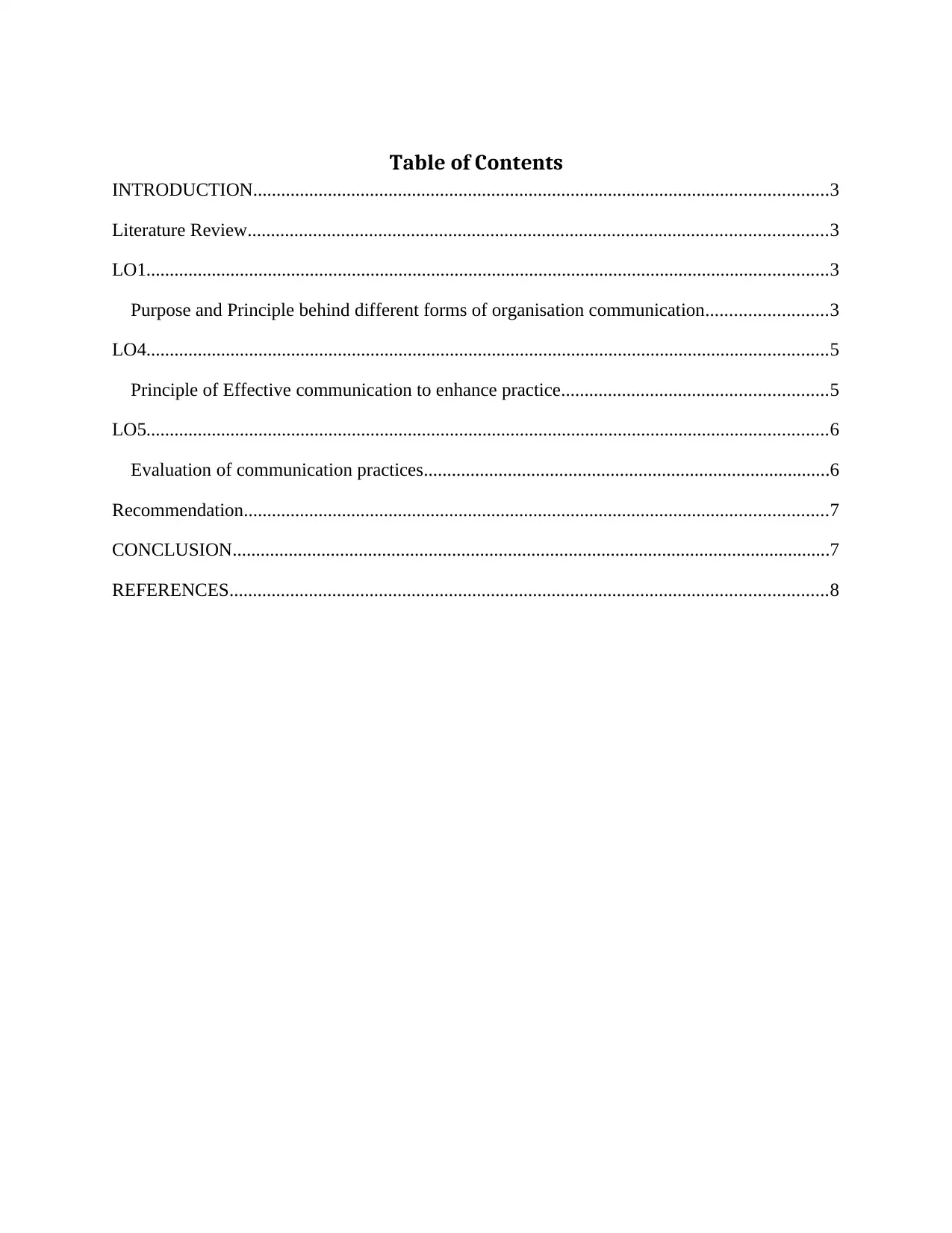
Table of Contents
INTRODUCTION...........................................................................................................................3
Literature Review............................................................................................................................3
LO1..................................................................................................................................................3
Purpose and Principle behind different forms of organisation communication..........................3
LO4..................................................................................................................................................5
Principle of Effective communication to enhance practice.........................................................5
LO5..................................................................................................................................................6
Evaluation of communication practices.......................................................................................6
Recommendation.............................................................................................................................7
CONCLUSION................................................................................................................................7
REFERENCES................................................................................................................................8
INTRODUCTION...........................................................................................................................3
Literature Review............................................................................................................................3
LO1..................................................................................................................................................3
Purpose and Principle behind different forms of organisation communication..........................3
LO4..................................................................................................................................................5
Principle of Effective communication to enhance practice.........................................................5
LO5..................................................................................................................................................6
Evaluation of communication practices.......................................................................................6
Recommendation.............................................................................................................................7
CONCLUSION................................................................................................................................7
REFERENCES................................................................................................................................8
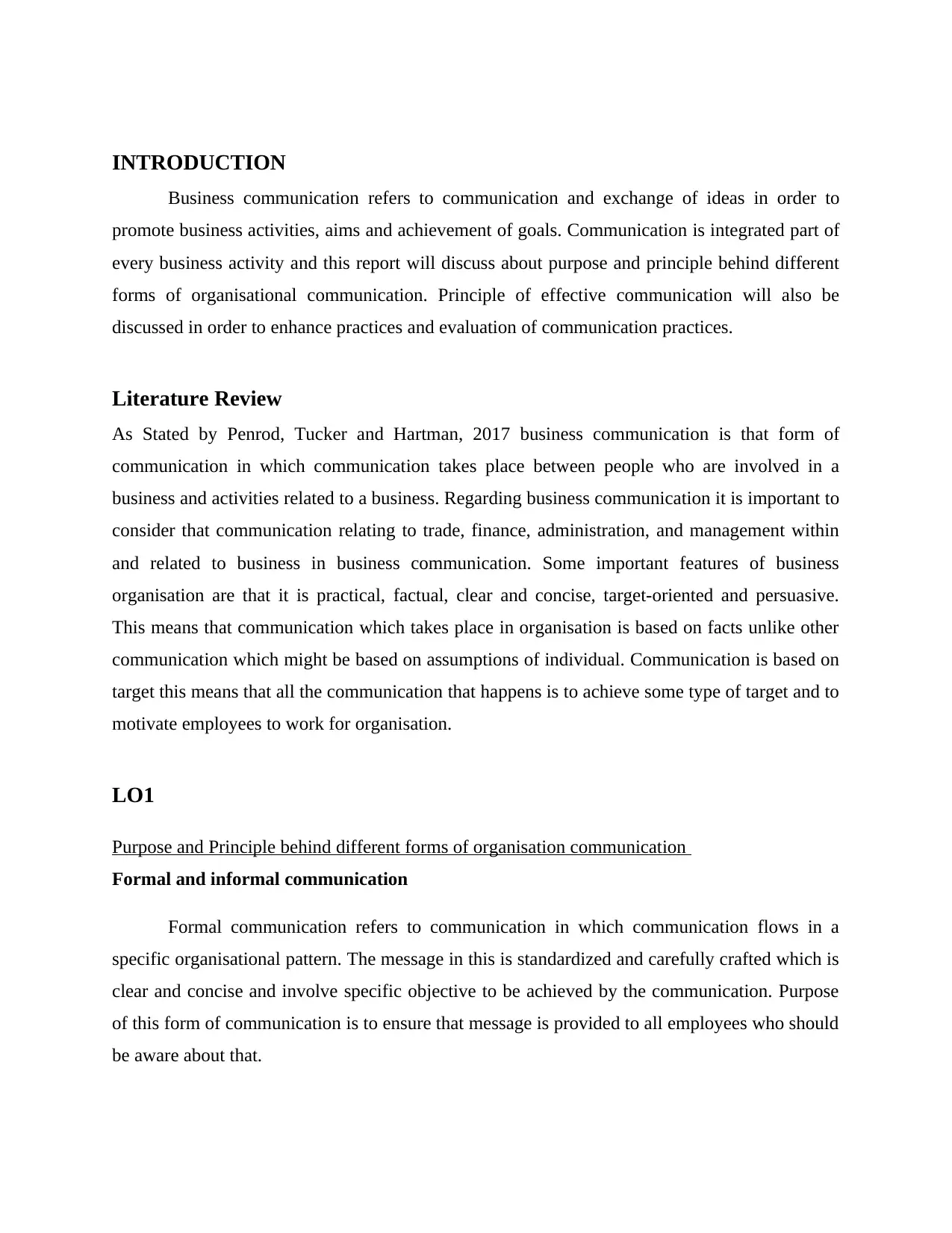
INTRODUCTION
Business communication refers to communication and exchange of ideas in order to
promote business activities, aims and achievement of goals. Communication is integrated part of
every business activity and this report will discuss about purpose and principle behind different
forms of organisational communication. Principle of effective communication will also be
discussed in order to enhance practices and evaluation of communication practices.
Literature Review
As Stated by Penrod, Tucker and Hartman, 2017 business communication is that form of
communication in which communication takes place between people who are involved in a
business and activities related to a business. Regarding business communication it is important to
consider that communication relating to trade, finance, administration, and management within
and related to business in business communication. Some important features of business
organisation are that it is practical, factual, clear and concise, target-oriented and persuasive.
This means that communication which takes place in organisation is based on facts unlike other
communication which might be based on assumptions of individual. Communication is based on
target this means that all the communication that happens is to achieve some type of target and to
motivate employees to work for organisation.
LO1
Purpose and Principle behind different forms of organisation communication
Formal and informal communication
Formal communication refers to communication in which communication flows in a
specific organisational pattern. The message in this is standardized and carefully crafted which is
clear and concise and involve specific objective to be achieved by the communication. Purpose
of this form of communication is to ensure that message is provided to all employees who should
be aware about that.
Business communication refers to communication and exchange of ideas in order to
promote business activities, aims and achievement of goals. Communication is integrated part of
every business activity and this report will discuss about purpose and principle behind different
forms of organisational communication. Principle of effective communication will also be
discussed in order to enhance practices and evaluation of communication practices.
Literature Review
As Stated by Penrod, Tucker and Hartman, 2017 business communication is that form of
communication in which communication takes place between people who are involved in a
business and activities related to a business. Regarding business communication it is important to
consider that communication relating to trade, finance, administration, and management within
and related to business in business communication. Some important features of business
organisation are that it is practical, factual, clear and concise, target-oriented and persuasive.
This means that communication which takes place in organisation is based on facts unlike other
communication which might be based on assumptions of individual. Communication is based on
target this means that all the communication that happens is to achieve some type of target and to
motivate employees to work for organisation.
LO1
Purpose and Principle behind different forms of organisation communication
Formal and informal communication
Formal communication refers to communication in which communication flows in a
specific organisational pattern. The message in this is standardized and carefully crafted which is
clear and concise and involve specific objective to be achieved by the communication. Purpose
of this form of communication is to ensure that message is provided to all employees who should
be aware about that.
⊘ This is a preview!⊘
Do you want full access?
Subscribe today to unlock all pages.

Trusted by 1+ million students worldwide
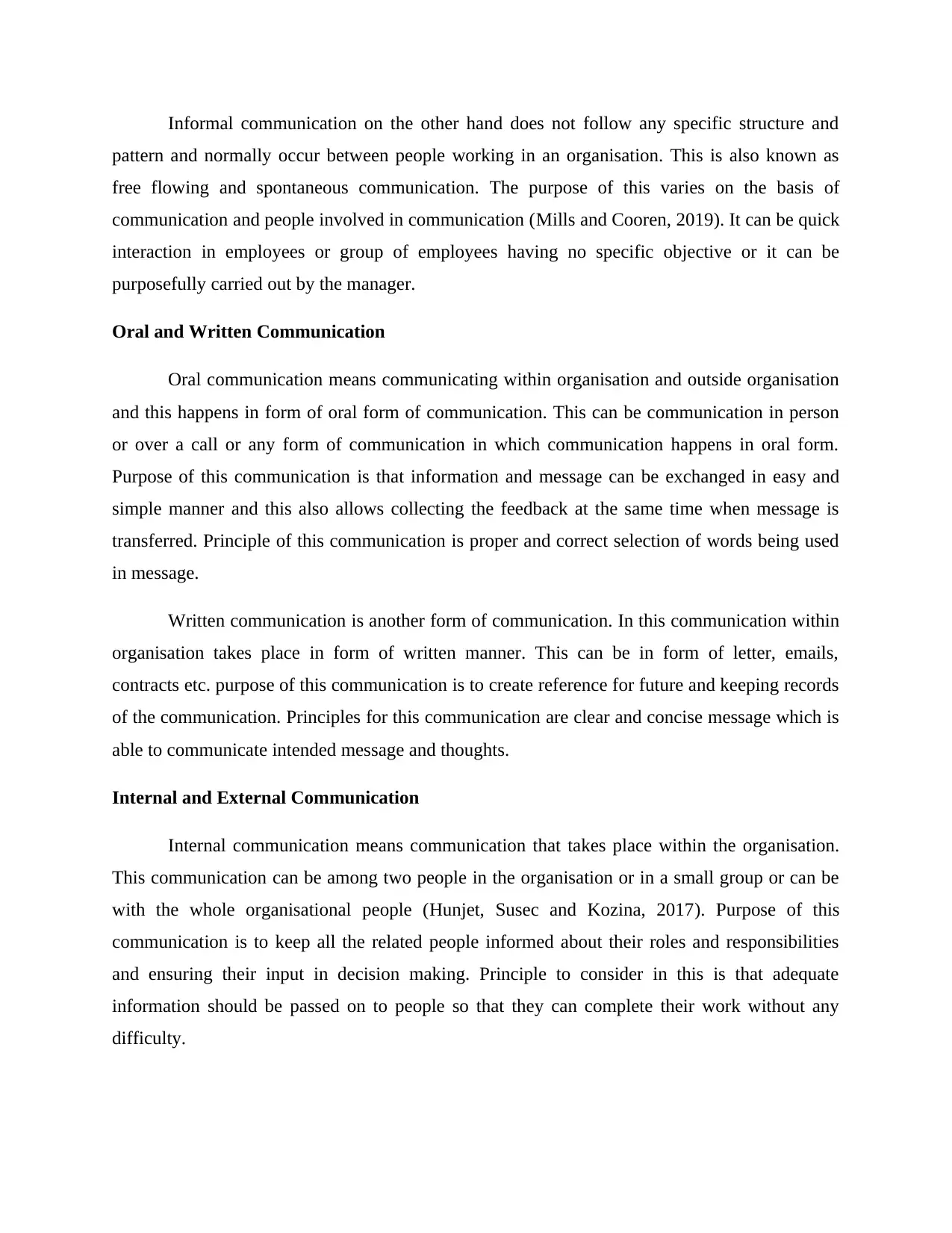
Informal communication on the other hand does not follow any specific structure and
pattern and normally occur between people working in an organisation. This is also known as
free flowing and spontaneous communication. The purpose of this varies on the basis of
communication and people involved in communication (Mills and Cooren, 2019). It can be quick
interaction in employees or group of employees having no specific objective or it can be
purposefully carried out by the manager.
Oral and Written Communication
Oral communication means communicating within organisation and outside organisation
and this happens in form of oral form of communication. This can be communication in person
or over a call or any form of communication in which communication happens in oral form.
Purpose of this communication is that information and message can be exchanged in easy and
simple manner and this also allows collecting the feedback at the same time when message is
transferred. Principle of this communication is proper and correct selection of words being used
in message.
Written communication is another form of communication. In this communication within
organisation takes place in form of written manner. This can be in form of letter, emails,
contracts etc. purpose of this communication is to create reference for future and keeping records
of the communication. Principles for this communication are clear and concise message which is
able to communicate intended message and thoughts.
Internal and External Communication
Internal communication means communication that takes place within the organisation.
This communication can be among two people in the organisation or in a small group or can be
with the whole organisational people (Hunjet, Susec and Kozina, 2017). Purpose of this
communication is to keep all the related people informed about their roles and responsibilities
and ensuring their input in decision making. Principle to consider in this is that adequate
information should be passed on to people so that they can complete their work without any
difficulty.
pattern and normally occur between people working in an organisation. This is also known as
free flowing and spontaneous communication. The purpose of this varies on the basis of
communication and people involved in communication (Mills and Cooren, 2019). It can be quick
interaction in employees or group of employees having no specific objective or it can be
purposefully carried out by the manager.
Oral and Written Communication
Oral communication means communicating within organisation and outside organisation
and this happens in form of oral form of communication. This can be communication in person
or over a call or any form of communication in which communication happens in oral form.
Purpose of this communication is that information and message can be exchanged in easy and
simple manner and this also allows collecting the feedback at the same time when message is
transferred. Principle of this communication is proper and correct selection of words being used
in message.
Written communication is another form of communication. In this communication within
organisation takes place in form of written manner. This can be in form of letter, emails,
contracts etc. purpose of this communication is to create reference for future and keeping records
of the communication. Principles for this communication are clear and concise message which is
able to communicate intended message and thoughts.
Internal and External Communication
Internal communication means communication that takes place within the organisation.
This communication can be among two people in the organisation or in a small group or can be
with the whole organisational people (Hunjet, Susec and Kozina, 2017). Purpose of this
communication is to keep all the related people informed about their roles and responsibilities
and ensuring their input in decision making. Principle to consider in this is that adequate
information should be passed on to people so that they can complete their work without any
difficulty.
Paraphrase This Document
Need a fresh take? Get an instant paraphrase of this document with our AI Paraphraser
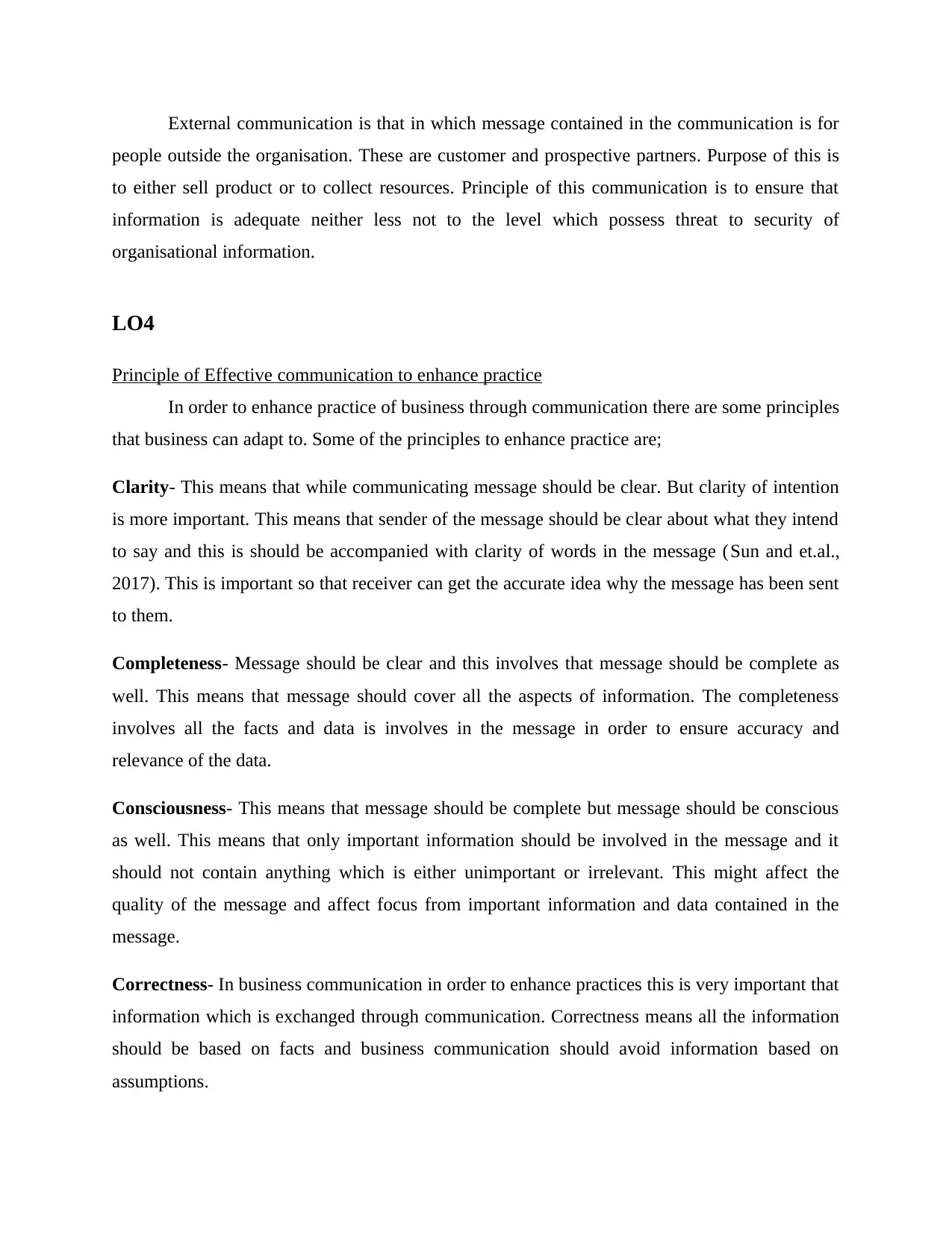
External communication is that in which message contained in the communication is for
people outside the organisation. These are customer and prospective partners. Purpose of this is
to either sell product or to collect resources. Principle of this communication is to ensure that
information is adequate neither less not to the level which possess threat to security of
organisational information.
LO4
Principle of Effective communication to enhance practice
In order to enhance practice of business through communication there are some principles
that business can adapt to. Some of the principles to enhance practice are;
Clarity- This means that while communicating message should be clear. But clarity of intention
is more important. This means that sender of the message should be clear about what they intend
to say and this is should be accompanied with clarity of words in the message (Sun and et.al.,
2017). This is important so that receiver can get the accurate idea why the message has been sent
to them.
Completeness- Message should be clear and this involves that message should be complete as
well. This means that message should cover all the aspects of information. The completeness
involves all the facts and data is involves in the message in order to ensure accuracy and
relevance of the data.
Consciousness- This means that message should be complete but message should be conscious
as well. This means that only important information should be involved in the message and it
should not contain anything which is either unimportant or irrelevant. This might affect the
quality of the message and affect focus from important information and data contained in the
message.
Correctness- In business communication in order to enhance practices this is very important that
information which is exchanged through communication. Correctness means all the information
should be based on facts and business communication should avoid information based on
assumptions.
people outside the organisation. These are customer and prospective partners. Purpose of this is
to either sell product or to collect resources. Principle of this communication is to ensure that
information is adequate neither less not to the level which possess threat to security of
organisational information.
LO4
Principle of Effective communication to enhance practice
In order to enhance practice of business through communication there are some principles
that business can adapt to. Some of the principles to enhance practice are;
Clarity- This means that while communicating message should be clear. But clarity of intention
is more important. This means that sender of the message should be clear about what they intend
to say and this is should be accompanied with clarity of words in the message (Sun and et.al.,
2017). This is important so that receiver can get the accurate idea why the message has been sent
to them.
Completeness- Message should be clear and this involves that message should be complete as
well. This means that message should cover all the aspects of information. The completeness
involves all the facts and data is involves in the message in order to ensure accuracy and
relevance of the data.
Consciousness- This means that message should be complete but message should be conscious
as well. This means that only important information should be involved in the message and it
should not contain anything which is either unimportant or irrelevant. This might affect the
quality of the message and affect focus from important information and data contained in the
message.
Correctness- In business communication in order to enhance practices this is very important that
information which is exchanged through communication. Correctness means all the information
should be based on facts and business communication should avoid information based on
assumptions.
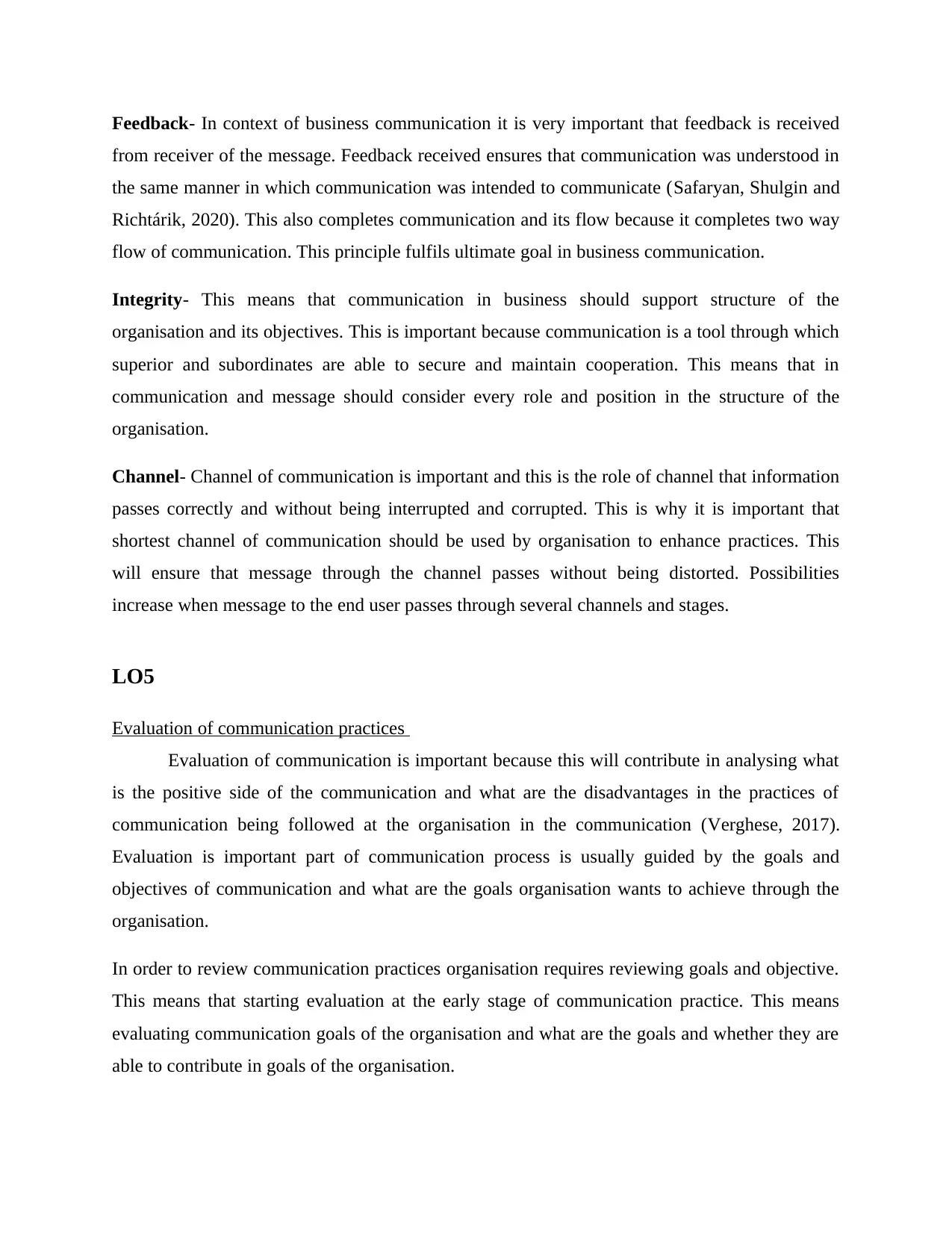
Feedback- In context of business communication it is very important that feedback is received
from receiver of the message. Feedback received ensures that communication was understood in
the same manner in which communication was intended to communicate (Safaryan, Shulgin and
Richtárik, 2020). This also completes communication and its flow because it completes two way
flow of communication. This principle fulfils ultimate goal in business communication.
Integrity- This means that communication in business should support structure of the
organisation and its objectives. This is important because communication is a tool through which
superior and subordinates are able to secure and maintain cooperation. This means that in
communication and message should consider every role and position in the structure of the
organisation.
Channel- Channel of communication is important and this is the role of channel that information
passes correctly and without being interrupted and corrupted. This is why it is important that
shortest channel of communication should be used by organisation to enhance practices. This
will ensure that message through the channel passes without being distorted. Possibilities
increase when message to the end user passes through several channels and stages.
LO5
Evaluation of communication practices
Evaluation of communication is important because this will contribute in analysing what
is the positive side of the communication and what are the disadvantages in the practices of
communication being followed at the organisation in the communication (Verghese, 2017).
Evaluation is important part of communication process is usually guided by the goals and
objectives of communication and what are the goals organisation wants to achieve through the
organisation.
In order to review communication practices organisation requires reviewing goals and objective.
This means that starting evaluation at the early stage of communication practice. This means
evaluating communication goals of the organisation and what are the goals and whether they are
able to contribute in goals of the organisation.
from receiver of the message. Feedback received ensures that communication was understood in
the same manner in which communication was intended to communicate (Safaryan, Shulgin and
Richtárik, 2020). This also completes communication and its flow because it completes two way
flow of communication. This principle fulfils ultimate goal in business communication.
Integrity- This means that communication in business should support structure of the
organisation and its objectives. This is important because communication is a tool through which
superior and subordinates are able to secure and maintain cooperation. This means that in
communication and message should consider every role and position in the structure of the
organisation.
Channel- Channel of communication is important and this is the role of channel that information
passes correctly and without being interrupted and corrupted. This is why it is important that
shortest channel of communication should be used by organisation to enhance practices. This
will ensure that message through the channel passes without being distorted. Possibilities
increase when message to the end user passes through several channels and stages.
LO5
Evaluation of communication practices
Evaluation of communication is important because this will contribute in analysing what
is the positive side of the communication and what are the disadvantages in the practices of
communication being followed at the organisation in the communication (Verghese, 2017).
Evaluation is important part of communication process is usually guided by the goals and
objectives of communication and what are the goals organisation wants to achieve through the
organisation.
In order to review communication practices organisation requires reviewing goals and objective.
This means that starting evaluation at the early stage of communication practice. This means
evaluating communication goals of the organisation and what are the goals and whether they are
able to contribute in goals of the organisation.
⊘ This is a preview!⊘
Do you want full access?
Subscribe today to unlock all pages.

Trusted by 1+ million students worldwide
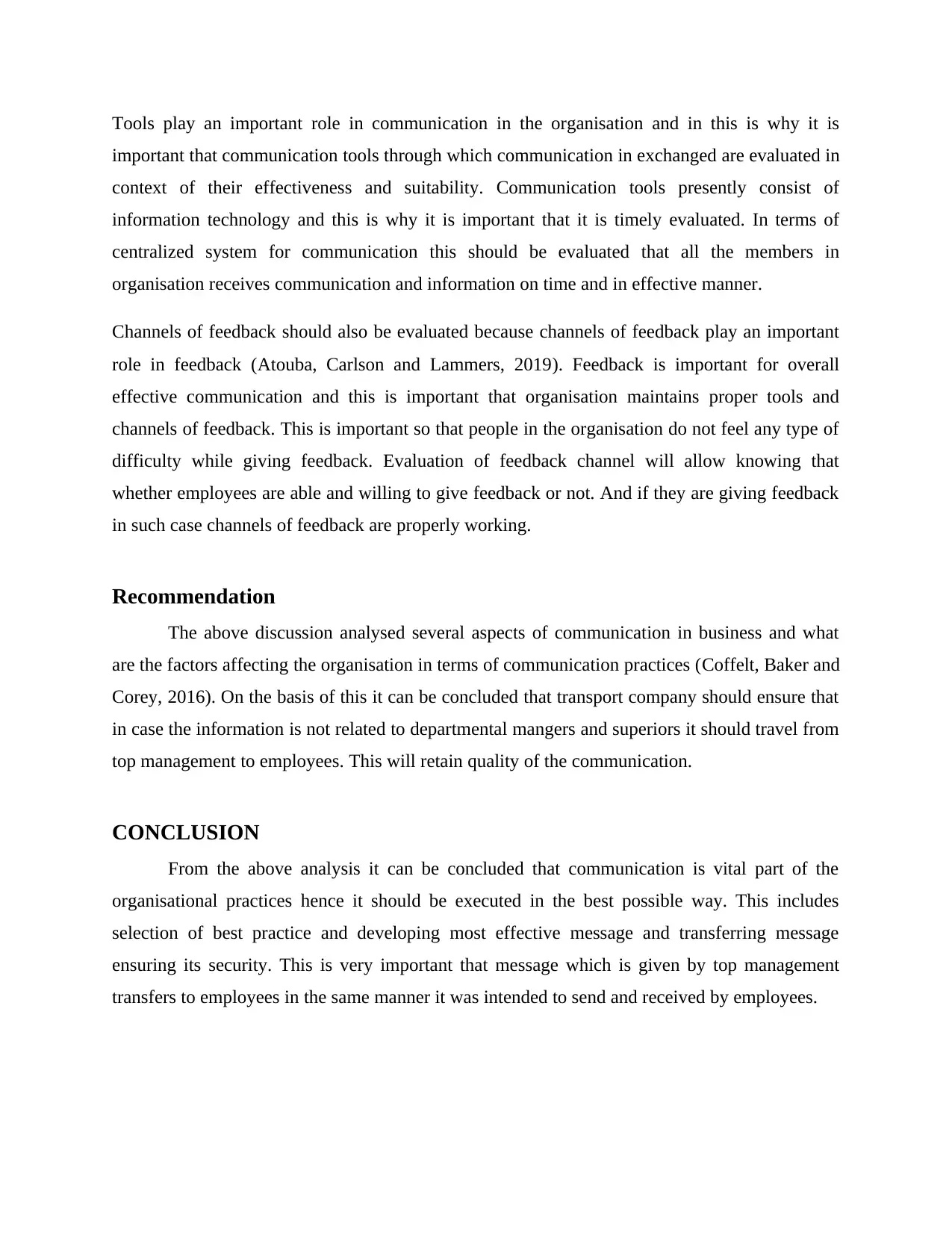
Tools play an important role in communication in the organisation and in this is why it is
important that communication tools through which communication in exchanged are evaluated in
context of their effectiveness and suitability. Communication tools presently consist of
information technology and this is why it is important that it is timely evaluated. In terms of
centralized system for communication this should be evaluated that all the members in
organisation receives communication and information on time and in effective manner.
Channels of feedback should also be evaluated because channels of feedback play an important
role in feedback (Atouba, Carlson and Lammers, 2019). Feedback is important for overall
effective communication and this is important that organisation maintains proper tools and
channels of feedback. This is important so that people in the organisation do not feel any type of
difficulty while giving feedback. Evaluation of feedback channel will allow knowing that
whether employees are able and willing to give feedback or not. And if they are giving feedback
in such case channels of feedback are properly working.
Recommendation
The above discussion analysed several aspects of communication in business and what
are the factors affecting the organisation in terms of communication practices (Coffelt, Baker and
Corey, 2016). On the basis of this it can be concluded that transport company should ensure that
in case the information is not related to departmental mangers and superiors it should travel from
top management to employees. This will retain quality of the communication.
CONCLUSION
From the above analysis it can be concluded that communication is vital part of the
organisational practices hence it should be executed in the best possible way. This includes
selection of best practice and developing most effective message and transferring message
ensuring its security. This is very important that message which is given by top management
transfers to employees in the same manner it was intended to send and received by employees.
important that communication tools through which communication in exchanged are evaluated in
context of their effectiveness and suitability. Communication tools presently consist of
information technology and this is why it is important that it is timely evaluated. In terms of
centralized system for communication this should be evaluated that all the members in
organisation receives communication and information on time and in effective manner.
Channels of feedback should also be evaluated because channels of feedback play an important
role in feedback (Atouba, Carlson and Lammers, 2019). Feedback is important for overall
effective communication and this is important that organisation maintains proper tools and
channels of feedback. This is important so that people in the organisation do not feel any type of
difficulty while giving feedback. Evaluation of feedback channel will allow knowing that
whether employees are able and willing to give feedback or not. And if they are giving feedback
in such case channels of feedback are properly working.
Recommendation
The above discussion analysed several aspects of communication in business and what
are the factors affecting the organisation in terms of communication practices (Coffelt, Baker and
Corey, 2016). On the basis of this it can be concluded that transport company should ensure that
in case the information is not related to departmental mangers and superiors it should travel from
top management to employees. This will retain quality of the communication.
CONCLUSION
From the above analysis it can be concluded that communication is vital part of the
organisational practices hence it should be executed in the best possible way. This includes
selection of best practice and developing most effective message and transferring message
ensuring its security. This is very important that message which is given by top management
transfers to employees in the same manner it was intended to send and received by employees.
Paraphrase This Document
Need a fresh take? Get an instant paraphrase of this document with our AI Paraphraser
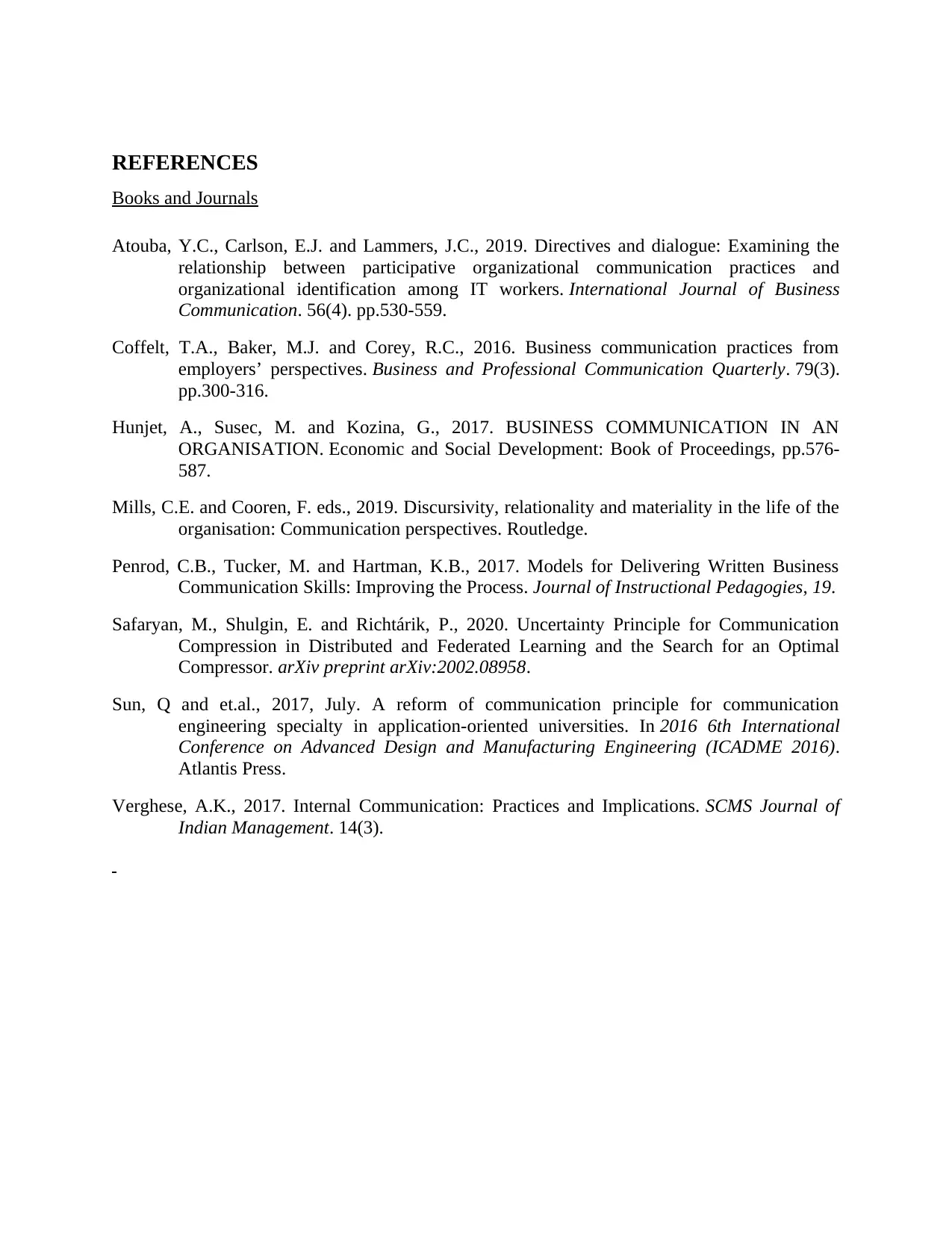
REFERENCES
Books and Journals
Atouba, Y.C., Carlson, E.J. and Lammers, J.C., 2019. Directives and dialogue: Examining the
relationship between participative organizational communication practices and
organizational identification among IT workers. International Journal of Business
Communication. 56(4). pp.530-559.
Coffelt, T.A., Baker, M.J. and Corey, R.C., 2016. Business communication practices from
employers’ perspectives. Business and Professional Communication Quarterly. 79(3).
pp.300-316.
Hunjet, A., Susec, M. and Kozina, G., 2017. BUSINESS COMMUNICATION IN AN
ORGANISATION. Economic and Social Development: Book of Proceedings, pp.576-
587.
Mills, C.E. and Cooren, F. eds., 2019. Discursivity, relationality and materiality in the life of the
organisation: Communication perspectives. Routledge.
Penrod, C.B., Tucker, M. and Hartman, K.B., 2017. Models for Delivering Written Business
Communication Skills: Improving the Process. Journal of Instructional Pedagogies, 19.
Safaryan, M., Shulgin, E. and Richtárik, P., 2020. Uncertainty Principle for Communication
Compression in Distributed and Federated Learning and the Search for an Optimal
Compressor. arXiv preprint arXiv:2002.08958.
Sun, Q and et.al., 2017, July. A reform of communication principle for communication
engineering specialty in application-oriented universities. In 2016 6th International
Conference on Advanced Design and Manufacturing Engineering (ICADME 2016).
Atlantis Press.
Verghese, A.K., 2017. Internal Communication: Practices and Implications. SCMS Journal of
Indian Management. 14(3).
Books and Journals
Atouba, Y.C., Carlson, E.J. and Lammers, J.C., 2019. Directives and dialogue: Examining the
relationship between participative organizational communication practices and
organizational identification among IT workers. International Journal of Business
Communication. 56(4). pp.530-559.
Coffelt, T.A., Baker, M.J. and Corey, R.C., 2016. Business communication practices from
employers’ perspectives. Business and Professional Communication Quarterly. 79(3).
pp.300-316.
Hunjet, A., Susec, M. and Kozina, G., 2017. BUSINESS COMMUNICATION IN AN
ORGANISATION. Economic and Social Development: Book of Proceedings, pp.576-
587.
Mills, C.E. and Cooren, F. eds., 2019. Discursivity, relationality and materiality in the life of the
organisation: Communication perspectives. Routledge.
Penrod, C.B., Tucker, M. and Hartman, K.B., 2017. Models for Delivering Written Business
Communication Skills: Improving the Process. Journal of Instructional Pedagogies, 19.
Safaryan, M., Shulgin, E. and Richtárik, P., 2020. Uncertainty Principle for Communication
Compression in Distributed and Federated Learning and the Search for an Optimal
Compressor. arXiv preprint arXiv:2002.08958.
Sun, Q and et.al., 2017, July. A reform of communication principle for communication
engineering specialty in application-oriented universities. In 2016 6th International
Conference on Advanced Design and Manufacturing Engineering (ICADME 2016).
Atlantis Press.
Verghese, A.K., 2017. Internal Communication: Practices and Implications. SCMS Journal of
Indian Management. 14(3).
1 out of 8
Related Documents
Your All-in-One AI-Powered Toolkit for Academic Success.
+13062052269
info@desklib.com
Available 24*7 on WhatsApp / Email
![[object Object]](/_next/static/media/star-bottom.7253800d.svg)
Unlock your academic potential
Copyright © 2020–2025 A2Z Services. All Rights Reserved. Developed and managed by ZUCOL.





